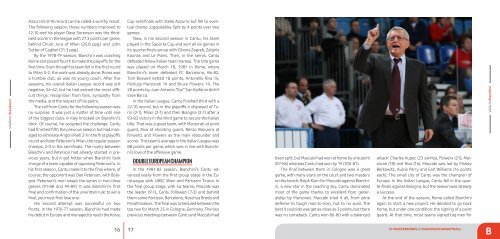VALERIO BIANCHINI_31 Masterminds of European Basketball
- No tags were found...
You also want an ePaper? Increase the reach of your titles
YUMPU automatically turns print PDFs into web optimized ePapers that Google loves.
Vladimir Stankovic<br />
Azzurra’s 8-18 record can be called a worthy result.<br />
The following season, those numbers improved to<br />
12-10 and his player Dave Sorenson was the thirdbest<br />
scorer in the league with 27.3 points per game,<br />
behind Chuck Jura <strong>of</strong> Milan (35.8 ppg.) and John<br />
Sutter <strong>of</strong> Cagliari (<strong>31</strong>.3 ppg.).<br />
By the 1978-79 season, Bianchini was coaching<br />
Rome and placed fourth to make the play<strong>of</strong>fs for the<br />
first time. Even though his team fell in the first round<br />
to Milan 0-2, the work was already done. Rome was<br />
a humble club, as was its young coach. After five<br />
seasons, his overall Italian League record was still<br />
negative, 56-62, but he had earned the most difficult<br />
things: recognition from fans, sympathy from<br />
the media, and the respect <strong>of</strong> his peers.<br />
The call from Cantu for the following season was<br />
no surprise. It was just a matter <strong>of</strong> time until one<br />
<strong>of</strong> the biggest clubs in Italy knocked on Bianchini’s<br />
door. Of course, he accepted the challenge. Cantu<br />
had finished fifth the previous season but had managed<br />
to eliminate Arigoni Rieti 2-1in the first play<strong>of</strong>fs<br />
round and later Peterson’s Milan, the regular season<br />
champs, 2-0 in the semifinals. The rivalry between<br />
Bianchini and Peterson had already started in previous<br />
years, but it got hotter when Bianchini took<br />
charge <strong>of</strong> a team capable <strong>of</strong> opposing Peterson’s. In<br />
his first season, Cantu made it to the final where, <strong>of</strong><br />
course, the opponent was Dan Peterson, with Bologna.<br />
Peterson’s men swept the series in two close<br />
games (91-88 and 94-89). It was Bianchini’s first<br />
final and confirmation <strong>of</strong> the unwritten rule: to win a<br />
final, you must first lose one.<br />
His second attempt was successful on two<br />
fronts. In the 1976-77 season, Bianchini had made<br />
his debut in Europe and managed to reach the Korac<br />
Cup semifinals with Stella Azzurra but fell to eventual<br />
champ Jugoplastika Split by 4 points over two<br />
games.<br />
Now, in his second season in Cantu, his team<br />
played in the Saporta Cup and won all six games in<br />
its quarterfinals group with Cibona Zagreb, Zalgiris<br />
Kaunas and Le Mans. Then, in the semis, Cantu<br />
defeated fellow Italian team Varese. The title game<br />
was played on March 18, 1981 in Rome, where<br />
Bianchini’s team defeated FC Barcelona, 86-82.<br />
Tom Boswell netted 18 points, Antonello Riva 15,<br />
Pierluigi Marzorati 14 and Bruce Flowers 14. The<br />
28 points by Juan Antonio “Epi” San Epifanio didn’t<br />
save Barca.<br />
In the Italian League, Cantu finished third with a<br />
22-10 record, but in the play<strong>of</strong>fs it disposed <strong>of</strong> Turin<br />
(2-1), Milan (2-1) and then Bologna (2-1) after a<br />
93-83 victory in the third game to secure the Italian<br />
title. That was a great team, with Marzorati at point<br />
guard, Riva at shooting guard, Renzo Bariviera at<br />
forward, and Flowers as the main rebounder and<br />
scorer. This team’s average in the Italian League was<br />
88 points per game, which was in line with Bianchini’s<br />
love <strong>of</strong> the <strong>of</strong>fensive game.<br />
Double <strong>European</strong> champion<br />
In the 1981-82 season, Bianchini’s Cantu advanced<br />
easily from the first group stage in the EuroLeague<br />
with UBSC Wien and Partizani Tirana. In<br />
the final group stage, with six teams, Maccabi was<br />
the leader (9-1), Cantu followed (7-3) and behind<br />
them came Partizan, Barcelona, Naschua Breda and<br />
Panathinaikos. The final was scheduled between the<br />
top two for March 25 in Cologne, Germany. The two<br />
previous meetings between Cantu and Maccabi had<br />
been split, but Maccabi had won at home by one point<br />
(87-86) whereas Cantu had won by 19 (100-81).<br />
The final between them in Cologne was a great<br />
game, with many stars on the court and two masters<br />
on the bench: Ralph Klein for Maccabi against Bianchini,<br />
a new star in the coaching sky. Cantu dominated<br />
most <strong>of</strong> the game thanks to excellent floor generalship<br />
by Marzorati. Maccabi tried it all, from zone<br />
defense to tough man-to-man, but to no avail. The<br />
best it could do was get as close as 3 points, but there<br />
was no comeback. Cantu won 86-80 with a balanced<br />
attack: Charles Kupec (23 points), Flowers (21), Marzorati<br />
(18) and Riva (16). Maccabi was led by Mickey<br />
Berkowitz, Aulcie Perry and Earl Williams (16 points<br />
each). The small city <strong>of</strong> Cantu was the champion <strong>of</strong><br />
Europe. In the Italian League, Cantu fell in the quarte-finals<br />
against Bologna, but the season was already<br />
a success.<br />
At the end <strong>of</strong> the season, Rome called Bianchini<br />
again to start a new project. He decided to go back<br />
home, but under one condition: the signing <strong>of</strong> a point<br />
guard. At that time, most teams signed big men for<br />
Valerio Bianchini<br />
16 17<br />
<strong>31</strong> MASTERMINDS <strong>of</strong> EUROPEAN BASKETBALL<br />
B

















